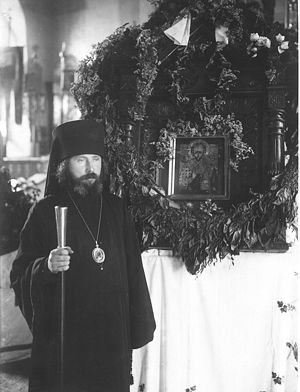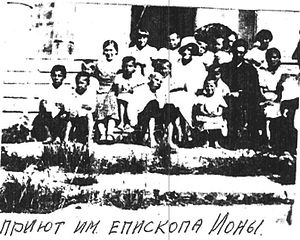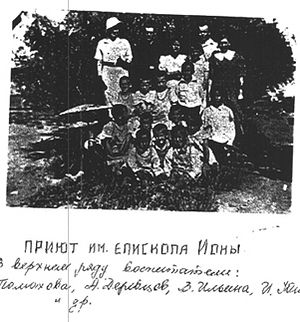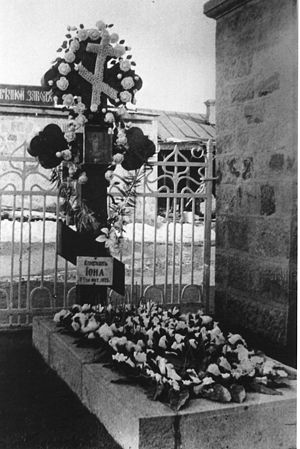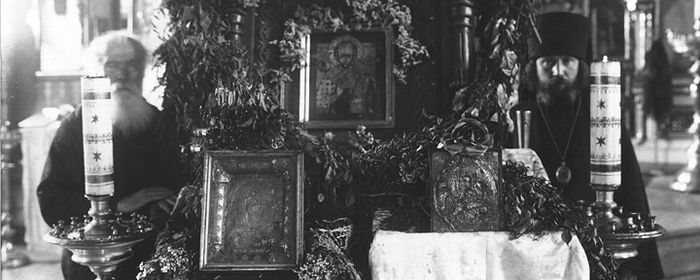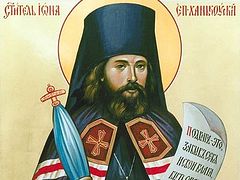By the time of his righteous repose on October 7/ 20, 1925, Bishop Jonah of Hankow (Manchuria) had already made a deep impression on his contemporaries by his God-pleasing life, his ebullient activity, and his unremitting ascetic labors. His brief, three-year episcopacy was marked by a wealth of accomplishments. He died at the age of only 37, crowned by holiness.
Bishop Jonah (Pokrovsky), Vladimir before monasticism, was born on April 17, 1888 to a peasant family in the Kozelsk district of Kaluga governate. Vladimir was orphaned early in childhood, and was adopted by a rural deacon surnamed Pokrovsky. Growing up in poverty, he managed while still young to learn the Church Slavonic language of the Old Testament, and was in the top of his class at seminary and again at the Kazan Theological Academy. In his third year at the academy he received the monastic tonsure, and went to Optina Monastery, where he received guidance in the monastic life from the holy Optina elders Joseph (Litovkin) and Anatoly (Potapov). In Optina, Fr. Jonah was ordained a hieromonk.
Having returned to the Kazan Theological Academy and graduating from it in 1909, Fr. Jonah accepted a professorship, teaching New Testament; this was quite against his will, but in his humility he submitted to the strict guidance of his elders. In 1916, during World War I, Hieromonk Jonah became the main chaplain of the Russian 11th army. Before the war, a seemingly great field of opportunity spread out before the young hieromonk—a scholar, priest and preacher—but very soon it was eclipsed by the horrific events of 1917. The pastor-ascetic was banished from Kazan; in Perm he was arrested and then beaten to unconsciousness by the Bolsheviks. He was then sent for trial in Tyumen, Siberia.
Having thus shared the lot of Russia's new confessors, he was providentially freed by the Whites on his way to Tyumen. With the White Army in Omsk, he was raised to the rank of igumen and appointed senior priest of the southern volunteer army. When they suffered defeat by the Red Army, Fr. Jonah retreated with Dutow’s army across the eastern frontier into China. The strenuous trek through Turkestan and the Gobi Desert, and then across the Pamir mountain, range was made more difficult by a scarcity of supplies. In places they had to scale ice-covered hills, clutching onto projections and scant shrubs, their bare bands torn and bleeding. Through all this the Lord preserved Fr. Jonah, as he himself declared, for later service as a bishop.
Having arrived to the Western China, Fr. Jonah came first to Shanghai, and was then appointed to the Russian Spiritual Mission in Beijing, where he was elevated to the rank of archimandrite. In September of 1922, in Beijing, he was consecrated Bishop of Tianjin, the vicar of the Beijing Mission, and appoited rector of St. Innocent Missionary Cathedral in the city of Manzhouli. Among the bishops who participated in his consecration were the head of the Mission, Archbishop Innocent of Beijing, Bishops Melety of Transbalkal, and Bishop Simon of Shanghai (subsequently Archbishop of Beijing). Having arrived to Manzhouli on October 19, 1922, the newly consecrated archpastor began his holy work, proclaiming the Gospel of Christ.
Bishop Melety (later Metropolitan of Harbin and Manchuria) so describes the first steps of his archpastoral services:
“The people in the city of Manzhouli who had come from different parts of Russia, had not been brought up properly with regard to religious attitudes. The new large and magnificent church of the Mission was poorly attended by a small number of worshippers, and the church sermons were very weak. A zealous servant of God’s Church and an outstanding preacher, the young and energetic Bishop Jonah has first of all undertaken the education of his flock in the religious and moral life. In his church he established regular divine services, gathered an excellent choir, and he constantly preaches the Gospel. The temple is filled with worshippers, and is even packed with people. However, for the vigorous Bishop Jonah, this all seems insufficient. By the invitation of city council, he teaches God’s Law in a local secondary school. The pupils, who have grown fond of him, although knowing that passing an examination in God’s Law is not mandatory for them, have declared the desire to undergo an examination in this subject, and everyone was found to have good knowledge of it” (Bishop Melety, “In memory of Blessed Jonah”, Harbin (Special release, 1992), page 3.
Joachim Krupenin, an admirer of the bishop, wrote the following about his arrival:
“Everybody remembers the arrival of the bishop in Manzhouli. All waited for the bishop to be the way ordinary people visualized him; that is, full of greatness, importance and inaccessibility. But Bishop Jonah knew where and to whom he was going. He knew who and what awaits him. He knew that he would not be needed satiated and satisfied. The destitute were waiting for him, and he came to them. He has come not just as prince of Church but as loving friend and father—modestly, with affection and consolation for all. All were amazed by the extraordinary simplicity and availability of the archpastor upon his arrival. As a bright icon lamp lit in Manzhouli, the activity of Bishop Jonah has lit up like the face of Christ, calling to sufferers: “Come to me all you who labor and are heavy laden, and I will give rest to your souls.” All felt joy, for they understood that not all is lost when they have heard the vigorous appeal: “There is a way out—belief in God and love for your neighbors.” With this appeal for belief in God and love for neighbors began Vladika’s archpastoral activity. But words were not enough. Work was required. Huge work was needed. And work has begun... Not sparing his strength and health, and forgetting himself, he has given himself to the service of God and neighbors” (Joachim Krupenin, “Blessed Jonah, Bishop of Hankow, Personal Reminiscences of Bishop Jonah” (in Russian [Originally printed in China in 1925], pp. 14-15).
In the three years of his episcopate, he fulfilled Christ’s principal commandment of love of neighbor to such a degree that it would take even a diligent worker several decades to do as much. The dimensions and strength of this activity were remembered equally by the Orthodox and non-Orthodox. His Eminence Melety, then Bishop of Zabaikal, precisely summed up Bishop Jonah’s activity: “He fed the hungry, gave drink to the thirsty, took in strangers, clothed the naked, and visited the sick.”
The fulfillment of this commandment, for which he prepared himself by a life of ascetic struggle, was the substance of Bishop Jonah’s whole life—it was that good work which a bishop is enjoined to desire. It flourished in Manzhouli in unflagging efforts on behalf of children, for whom an orphanage was established. Nor were the needs of adults neglected; somehow he found time and strength for everyone, Russian and non-Russian.
The childrens’ shelter Bishop Jonah had established was his joy and consolation. When he grew weary he would go and “spend time with the youngsters,” as he would say. By the time of his death, the orphanage had space for forty children ages five to fourteen. There was a free elementary school and high school for up to five hundred students, with a cafeteria that fed two hundred people per day for free. An outpatient clinic provided medical aid and medicines to the poorest people of Manzhouli, free of charge. A library and reading room was set up for the people of Manzhouli, where books were also sold.
V. V. Frolov writes, “A characteristic feature of these quickly developing activities was their constant improvement. In the summer there were excursions for school children, a summer residence for orphanage children; at school was organized a fine string band; a scientific cinema was organized, which were used by all educational institutions of the city for a rather low tuition or for free. Every year at school new craft workshops opened. Children’s evening arrangements, performances, Christmas celebrations, and school exhibitions became events in the city. Simultaneously large-scale work in the church was undertaken. The church was restored again; a new part was built for early Liturgy. The organization of divine services during Bishop Jonah’s tenure can never be forgotten those who lived in Manzhouli. An excellent orator, blessed Bishop Jonah attracted a multitude of people to the church; on great feasts the large church was always overflowing. Experts on church singing confirm that Manzhouli’s hierarchical choir was comparable with any of the best choirs of Harbin. And all this was accomplished in a time when economic vitality everywhere was quickly fading” (V. Frolov, “Blessed Jonah, bishop of Hankow, Personal Reminiscences of Bishop Jonah”, p. 33).
Everyone mourned the bishop’s death.
It was only for himself that he found no time. When he fell ill with angina, he continued to focus his attention on the needs of others, and without giving it much thought, rinsed his throat with kerosene. This quickly led to blood poisoning.
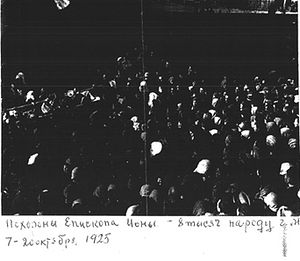 Photo: www.synod.com
Photo: www.synod.com There were throngs of people who gathered for the funeral, and there was universal mourning. A ten-year old paralyzed boy was miraculously healed when Saint Jonah appeared to him the night of his repose and told the boy to take his legs.
The late archpriest Nikolai Kiklovich, a clergyman from the Diocese of Harbin and Manchuria, talks about the cured boy:
“With death this love and feeling of respect for him did not stop; to the contrary, people began to love and esteem him even more—not as an ordinary mortal person but as God’s saint; this was especially so after the healing by Vladyka of sick adolescent Nikolai, whom medicine could not help and had left him to his own devices. And at that time, when human help appeared powerless to save the suffering lad, and his family had fallen into despair, then God’s might came to aid the sufferer by the intercession of newly departed Bishop Jonah. Now a hale and hearty man of twenty-seven, Nikolai, who was healed in the night and hour of Bishop Jonah’s death, is married with two teenage daughters, has a house and manages his household. Just a month ago, in his apartment, he recounted in detail to the writer of this narrative the story of his healing. After a wonderful vision of newly departed Bishop Jonah, he immediately woke up, and rose that night absolutely healthy, threw away his crutches and started walking around his room” (Priest N. Kiklovich, “19th anniversary of the memory of Right Reverend Jonah, Bishop of Hankow”, Heavenly Bread, No. 11-12, 1944, pp. 29-30).
In the summer of 1994 in the city of Kurgan (Siberia), Nikolai Dergachev died in deep old age. He had lived some time in Kustanai, where in 1989 he was visited by A. Baksheev, an admirer of the Bishop who was living in Australia: “I was looking for this boy; he lived in a well-appointed apartment, and I talked with him. It was like a fairy tale or a miracle. Living in China, we read this booklet and we never thought that we would ever meet this boy (from the letter of Baksheev to deacon Seraphim Gan).
With the blessing of the Synod of Bishops of the Russian Orthodox Church Abroad, émigrés from Manchuria realized a long-standing intent to go to China and try to find and bring back Saint Jonah's remains, which had been buried in 1925 near the St Innocent cathedral. Subsequently the cathedral was blown up and the graves demolished. Those who went succeeded in obtaining permission from local officials to excavate, but at the supposed site of the grave, they found nothing.
The memory of the life, the ascetic labors and the righteous repose of Bishop Jonah did not die out. In consensus with the unanimous voice of Bishop Jonah's contemporaries —archpastors of the Far East, his clergy and flock—and revering his labors as a church teacher, his extraordinary works of charity, his whole life aflame with love for his neighbor; recalling his exploit of confession and the miracle wrought after his burial, the Synod of Bishops of the Russian Orthodox Church Outside of Russia determined that Bishop Jonah of Hankow be revered as a God-pleaser in the choirs of saints who shone forth in the Russia land.
We magnify...
The Synod's decision to glorify Bishop Jonah of Hankow and Manchuria was greeted with great joy, especially by those Russian émigrés from the Far East, who had personally known this holy hierarch and had been working to promote such a decision. Saint Jonah was, in fact, the third Russian hierarch of the Far East to be glorified in as many years, following Saint Nicholas of Japan (Jan. 1994) and Saint John of Shanghai and San Francisco (July 1994). However, the great majority of the faithful were not well acquainted (if at all) with Saint Jonah, and the six short weeks before the scheduled glorification was scarcely adequate to properly prepare the faithful for such a momentous event in the life of the Church Abroad. Nevertheless, the occasion inspired a burst of activity. From the Western American diocese, a brief life of the Saint in Russian and in English was sped out to parishes and priests across the country and also posted on the Internet. Archbishop Alypy of Chicago and Hieromonk Andrei at Holy Trinity Monastery painted icons of the Saint, while Deacon Seraphim Gan was commissioned to write the service. The Chicago diocese prepared commemorative booklets and printed copies of Archbishop Alypy's icon for distribution at the glorification services.
The glorification of this wondrous hierarch took place simultaneously in San Francisco, with Archbishop Anthony presiding; in Chicago, with Archbishop Alypy presiding; and in Geelong (Australia), where Archbishop Hilarion (the future Metropolitan and First Hierarch of ROCOR), newly appointed to the Australian diocese, was the chief celebrant. Also taking part in these solemnities were two new hierarchs of the Church Abroad: Bishop Gabriel, who was consecrated on July 7 as Vicar Bishop of Australia (he currently resides in New York), and Bishop Michael of Toronto, who was consecrated July 12.
Inasmuch as most of the émigrés from Manchuria live on the West Coast, the principal celebration was held in San Francisco, at the cathedral of the Holy Virgin, “Joy of All Who Sorrow”…
At the Council of Bishops of the Russian Orthodox Church of the Moscow Patriarchate held February 2–3 February, 2016, the name of Holy Hierarch Jonah of Hankow was included in the calendar of saints of the Russian Orthodox Church, for veneration by all the faithful.
Holy Hierarch Jonah of Hankow, pray to God for us!
A Prayer to Saint Jonah, Bishop of Hankow
O blessed Jonah, wondrous ascetic and constant intercessor for us before God! Thou wast honored with the rank of bishop and didst show a wondrous love toward Christ, Who strengthened thee in thy labors and podvigs by His grace. Thou didst serve thy flock and children, and therefore had great boldness on the earth before the Trinity. When thou didst receive knowledge of thine imminent repose from the physician, thou didst hasten to the Lord with faith and humble prayer, accepting God’s will, lamenting only about thy flock, and especially the children, entreating the Lord not to leave them orphaned. Now appealing to thy fervent intercession, we earnestly entreat thee: with the merciful eye of thy love look upon us sinners, in need of thy help, strengthen the faithful in fervor, strengthen those who are fighting with their passions in ascetic labors, correct the slothful to struggle in pious zeal. Help all of us to love one another, as thou didst often admonish to keep this foremost commandment of Christ, and ask for us the visitation of the grace of the Holy Spirit. That keeping all thine instructions, we may be vouchsafed to inherit the Kingdom of Christ and together with thee, glorify the Father, the Son, and the Holy Spirit unto the ages of ages. Amen.
Troparion
Thou wast a good pastor for the Russian people, who had departed in exodus to live in a foreign land, guiding them in every way, but especially by the love of Christ, in all ways providing a model of love unfeigned. O father Jonah, holy hierarch of Christ, entreat Him for the salvation of our souls.
Kontakion
Thou didst not forbid the children to come to thee, O divinely blessed one, taking care for their daily needs, and establishing a safe haven for them. And even after thy repose thou hast not forsaken them; for in a dream thou didst heal a paralyzed boy. Wherefore, we cry out to thee: Rejoice, O all-glorious wonderworker Jonah!
Compiled from:

